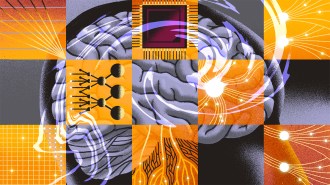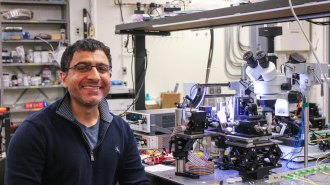Board an airplane and you can rest assured that it underwent rigorous safety testing before its first flight and, in fact, before it was even built. You can feel confident that engineering software searched across a vast range of design parameters to find the most aerodynamic shape, the sleekest wings, the sturdiest fuselage. Competing designs were “test-flown” in computer simulations to predict how they would perform in both friendly and turbulent skies.
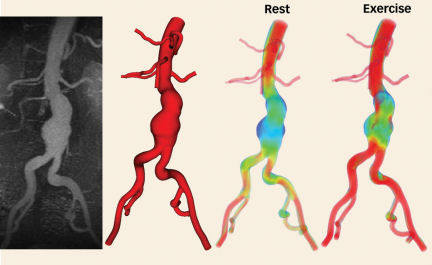
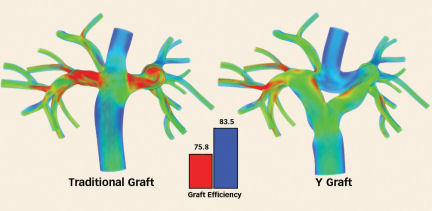
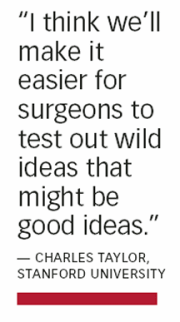
Go into the hospital for open-heart surgery, however, and your doctor will have designed your treatment using a very different process. Most likely, the surgeon will have considered what treatments have worked best on patients with symptoms similar to yours and then used a combination of medical protocols and intuition to decide on your case. Doctors can estimate the risks and benefits of a procedure by looking at how well it has gone in the past, but they can’t guarantee the outcome in your particular case. Advanced diagnostic tools and new drugs notwithstanding, medicine remains what it has always been: an empirical science.
Charles Taylor, a bioengineering professor at Stanford University, wants to make the run-up to a heart-surgery procedure more like the design of an airplane. His team has created a simulator, called SimVascular, that converts magnetic resonance imaging (MRI) data into a computerized geometric model of the patient’s blood vessels. The model offers surgeons the chance to test-fly various surgical procedures and other treatments to see which approach is most likely to best fit an individual patient’s physiology.
“A patient gets only one surgery. You can’t do two and see which is better,” says Taylor. Using the model, however, surgeons could perform multiple virtual surgeries and test out ideas without ever touching the patient.
SimVascular, which has been more than a decade in the works, is due to be released on Aug. 31 as open-source software freely available to researchers all over the world. Taylor’s team of cardiologists, surgeons, and others is already using the software to conduct basic research on the value of various heart treatments. For one type of serious congenital heart defect, the team has even used the software to design and test an entirely new surgical procedure. In the coming months, Stanford surgeons hope to perform that procedure for the first time.
“It’s a very different way of thinking about medicine, infusing engineering and mathematics into the surgical-planning process,” Taylor says.
Capturing circulation
For several decades, researchers have been modeling the physics of the human circulatory system. In recent years, they’ve moved away from traditional glass-and-water models toward computer models that use software tools handed down from the aerospace industry to solve fluid mechanics equations. These models have provided compelling evidence that simple fluid-mechanical forces, such as blood pressure and shear stress, underlie most heart disease, from the buildup of fatty plaques in arteries to the vessel-wall weakenings called aneurysms.
While such computer models have proved illuminating, they remain idealized descriptions of a generic circulatory system. Individual circulatory systems vary widely, not only in the locations of plaques and the widths of vessels but also in how various vessels connect with one another.
As a graduate student in the early 1990’s, Taylor realized that it should be possible to reconstruct a particular patient’s physiology from the three-dimensional images of blood vessels that MRI creates. At first, Taylor planned to use such patient-specific models simply to continue studying the link between fluid mechanics and vascular health.
“But at some point,” he says, “I realized that there was a much more important application: to help predict the outcome of a surgery.”
Off-the-shelf fluid mechanics software tools were not designed to study blood flow, so Taylor knew that they would be inadequate for his purposes. The human circulatory system is different from a network of pipes, he explains. For instance, blood pulses in bursts rather than flowing smoothly, and blood vessels, unlike pipes, are flexible tubes that expand and contract with each pulse.
To make matters more complicated, the pictures offered by an MRI, unlike the blueprints for a plumbing system, are far from complete. MRI images can show all the vessels larger than 1 millimeter in diameter, but that amounts to just a few hundred of the millions of blood vessels in a human body. To deal with these complexities, Taylor realized that he would have to build his model from scratch.
The SimVascular software starts with MRI images. Using image-recognition techniques, it extracts the geometry of the patient’s major blood vessels—all those big enough for the MRI to detect. Next, the software divides the geometric model into millions of tiny chunks. Then it chooses a representative point inside each chunk. At each such point, differential equations govern the blood’s velocity and pressure as well as the dynamics of the vessel walls.
To make these equations accurate where the model ends and blood flows into vessels too small for the MRI to detect, Taylor’s team used existing knowledge about the fractal geometry of the vascular system to estimate the blood pressure and other conditions at these ends. This feature, along with its description of flexible blood vessel walls, sets SimVascular apart from other attempts to model the circulatory system, says Jay Humphrey, a biomedical engineer at Texas A&M University in College Station. Taylor and his team use their system to “prescribe well what is happening at the ends, and that is critically important,” says Humphrey.
SimVascular uses the differential equations to create a flip-book movie of blood flow through the vascular system. The software divides each second of time into about 10,000 steps, and it uses the differential equations to calculate the forces at each representative point for each fraction of a second. Surgeons and researchers can view the movie and see detailed information about blood pressure, shear stress, and other conditions at each point in the blood vessels.
Creating such a movie involves simultaneously solving about 10 million equations for each time point. It currently takes the Stanford team’s supercomputers several days to create a 20-second movie, but Taylor hopes to bring the running time down to a single day or a few hours. Such a speedup would bring the modeling process well within the customary timetable for surgical planning.
Surgeons could use the completed model to test the effects of existing treatments on a given patient. Even more broadly, they could use the model to test “any procedure you could imagine,” Taylor says. Currently, a surgeon with an idea for a new type of surgery might, with luck, have a chance to try it out on a few animals or cadavers. Beyond that, surgeons have few options besides performing the surgery on a living, breathing patient.
“I think we’ll make it easier for surgeons to test out wild ideas that might be good ideas,” Taylor says.
Half a heart
Taylor’s team has already started testing one novel idea, which the Stanford surgeons may inaugurate within months. They hope that it will improve the quality of life for children born with a particularly serious type of heart defect.
Each year, up to 1,500 babies are born in the United States with, essentially, just half a heart. A normal heart has two pumping chambers. One, the right ventricle, pumps blood to the lungs to receive oxygen, and the other, the left ventricle, pumps the oxygenated blood through the body. In rare cases, however, one of these chambers fails to form properly.
Before birth, this malformation isn’t a problem, since a mother oxygenates her baby’s blood while it’s in the womb. To survive after birth, however, a baby with the defect requires a series of procedures to reroute the heart’s plumbing so that a single chamber can do all the pumping needed. After the rerouting, blood that has traveled through the body takes a detour to the lungs before returning to the heart.
For decades, surgeons performing this rerouting have connected the major blood vessels in the shape of a cross. In this procedure, two vertical veins coming from the upper and lower body are connected to two horizontal arteries carrying blood to the left and right lungs. Such a connection, however, isn’t very efficient. Blood flowing down to the junction collides head-on with blood flowing up, and the resulting turbulence wastes energy. Wasted energy is a serious matter in these patients, in whom a single pumping chamber has to do the work of two.
“Patients often end up having heart failure by their teenage years and needing a heart transplant,” says Alison Marsden, a researcher in Taylor’s lab who has been using SimVascular to study the rerouting procedure.
About 10 years ago, some surgeons started doing an “offset” procedure, in which the upper vein still connects at the central junction but the lower vein is shunted to one side, avoiding a head-on collision of blood. This procedure creates its own set of problems, however. It delivers more blood to one lung than to the other, potentially inhibiting growth of the neglected lung.
Together with Stanford pediatric cardiologist Jeffrey Feinstein, Marsden and Taylor came up with a new idea. The surgeon could attach a Y-shaped graft to the bottom vein, then connect the Y’s two short arms to the two horizontal arteries. This would create “off-ramps to the highway,” Taylor says. “From a fluid mechanics perspective, it made a lot of sense.”
The SimVascular software has enabled the team to compare the predicted efficiency of the Y graft with that of the offset graft. Earlier studies had suggested that the offset procedure is 90 percent efficient, which doctors would consider a good outcome. Those studies were limited, however, by the fact that tests of the efficiency of a patient’s heart are generally performed while the patient is at rest. It’s hard for doctors to predict from that information how the patient will fare during vigorous activity.
“The measurements we make are always on kids lying down, but that’s not how they spend their days,” Feinstein says.
SimVascular, however, can easily mimic exercise conditions. The simulator simply increases the heart rate and the blood flow leading to the major working muscles, decreases the blood flow to organs such as the stomach and kidneys, and adjusts a few other parameters that typically change during activity.
Marsden’s simulations suggested that during exercise, the offset graft’s efficiency drops to 65 to 70 percent, while the Y graft’s efficiency is 80 percent. During rest, the Y graft runs at 95 percent efficiency, also topping the offset’s performance.
When the surgeons collaborating with Taylor and Feinstein saw the numbers, they were eager to try the new procedure, a goal that the team hopes to make possible in the coming months. “The surgeons were willing to try it before we were, because that’s how they do things,” says Feinstein.
New light on heart disease
In addition to the Y-graft project, Taylor’s team is using SimVascular to investigate a host of other heart ailments and treatments, from studying whether exercise slows the growth of aortic aneurysms to examining how blood flow in healthy children compares with that in babies born with severe narrowing of the aorta.
Drawing on her background in aerospace engineering, Marsden has been using optimization techniques to identify the best location and angle at which a surgeon should attach a coronary artery bypass graft. Coronary artery bypass is the typical “open-heart surgery” done on people with badly clogged heart arteries causing chest pain and threatening heart attacks.
The process is “similar to the design of an airplane wing, in which you look at how changing the shape affects lift and drag,” she says. “Here, we’re asking how the shape of the graft affects flow and shear stress,” the blood’s rubbing forces on vessel walls.
In another study, the team has come up with some findings about treatment options for high blood pressure in the arteries to the lungs, known as pulmonary hypertension. Between 50,000 and 100,000 people in the United States suffer from pulmonary hypertension, and in the most severe cases, it leads to heart failure and death. Beverly Tang, a graduate student in Taylor’s lab, has been using SimVascular models of patients with pulmonary hypertension to calculate how their high blood pressure affects shear stress. It’s impossible to measure shear stress using typical diagnostic tools. “The software allows us to get information we can’t get in the clinic,” Feinstein says.
Shear stress plays an important role in vascular health, because the rubbing forces created by rushing blood stimulate the cells lining blood vessels to grow and develop normally. Taylor’s group has found that areas of low shear stress in the aorta tend to be where plaques accumulate.
“That’s one of the reasons exercise is such a good thing—it increases the flow and the shear stress,” Feinstein says.
Tang found that, according to SimVascular simulations, shear stress was almost an order of magnitude lower in the pulmonary-hypertension patients than in healthy individuals. To gauge the effect of this low shear stress, Tang subjected excised vessel-wall cells in the lab to shear stresses typical of those in pulmonary-hypertension patients. The cells became inflamed, and their level of functioning decreased.
The high blood pressure that defines pulmonary hypertension appears to set off “a cascade of complications,” Feinstein says. These effects may explain why the disease progresses, which has been a puzzle for medical researchers. Tang’s findings suggest that it may be appropriate to treat early cases of pulmonary hypertension more aggressively, using a drug called prostacyclin, which doctors usually reserve for severe cases. Unlike some other therapies, this drug increases blood flow, thereby raising shear stress. Using it in milder pulmonary-hypertension cases than usual, Feinstein suggests, may prevent the cascade that leads to full-blown disease.
“The simulations are giving us a whole new light on this disease,” Feinstein says.
With SimVascular’s public release on Aug. 31, the software “will start to get used on a much larger number of problems than we’re able to handle in-house,” Taylor says. While many of those problems are likely to be in the realm of basic research, Taylor hopes some researchers will develop the software into an even more potent tool to help doctors and surgeons decide how to treat specific patients.
“Engineers take it for granted that you’ll build a theoretical model and use it to make predictions, but medicine has not developed that way because bodies and diseases are so complex,” Taylor says. “But now,” he adds, “when I tell physicians about this approach, they say, ‘Wow—of course this should be done.'”






